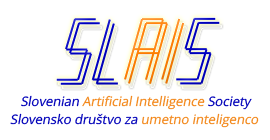Lecturer: prof. Larisa Soldatova, Department of Computing, Goldsmiths, University of London
Title: Data solutions for robot scientists
Time and place: Friday, 16.12., 14h, main lecture hall JSI/velika predavalnica IJS
Abstract: AI-powered robotic lab automation is a well-established trend in modern molecular biology. Automated laboratories are generating ever larger volumes of data and require new data solutions that provide AI software and machine learning tools with efficient and reliable access to data. The majority of existing databases are primarily designed for human users. In AI-based systems, the main data users are software agents. They query data with higher intensity, they depend on stable and reliable data resources, as well as flawless logic in data schemas, needed to support reasoning. They operate within more complex workflows, often in the context of integration with robotic equipment. Observing the requirements for AI systems, we have implemented Genesis-DB, a database specifically designed to support a robotic AI laboratory – the robot scientist Genesis. Genesis-DB provides fast and reliable access to large quantities of structured domain information to AI software. It is currently focused on metabolomic mass-spectrometry data, RNA-seq data, and microbial growth profiling data. However, the design is generic and could be extended to other AI-driven molecular biology laboratory data and beyond.
Short bio of the lecturer: Larisa Soldatova is Professor in Data Science in Goldsmiths, University of London. Larisa is an internationally recognised expert in knowledge representation, laboratory automation and data analytics, and their application to the Life Sciences. She is a co-lead of the EPSRC funded project ACTION on cancer (2018-2023) that aims to develop an AI system to support decision making about treatment of cancer patients. Previously, Larisa was a coordinator of the European project AdaLab that focused on the integration of AI with automated experimental practices. She is/was involved in a number of international projects on the development of semantic standards, e.g. the Ontology for Biomedical investigations (OBI), the ontology for Data Mining (OntoDM), Laboratory Protocols (EXACT). Her work has been published in the World’s top journals, e.g. Science, Nature Biotechnology, Royal Society Interface, Bioinformatics.

